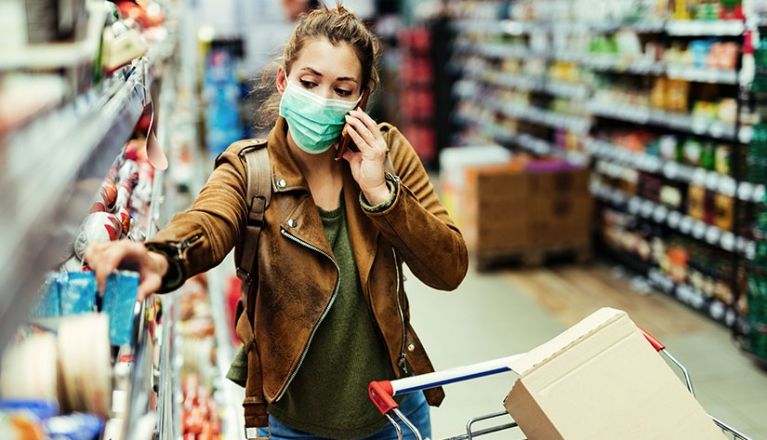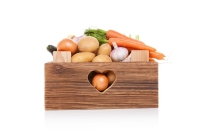- #Agri Food
- 2020/04/10
- 0
-
11
The impacts of confinement on food consumption

As soon as the prospect of confinement was announced, consumers began to hoard food products such as pasta, rice, sugar, conserves, frozen food, ham and bread, and, curiously, toilet paper. Apart from the fear of infection, the key concern is securing food supplies and whether we may be confronted by food shortages. And for some, these issues are more important than catching the virus itself.
Stores were cleaned out in the space of a few hours on Monday 16 March. Intermarché sales increased by 250% (all sections combined), nearly three times more than the purchases of the end of the previous week, and those of Auchan by 150%. In the last few days, the story has been the same in almost all the stores having remained open. Food expenditure more than tripled on 16 March, falling afterwards then peaking once again a week later. In early April, it was down by nearly 35%. The number of transactions was 27% lower than last year in the week of 23 March. “However, average basket sizes remain much larger than last year, up 48%,” reports INSEE, France’s national statistics and economic research institute.

Why are people hoarding certain products?
Flour, pasta, eggs and rice are inexpensive basic products that keep for a long time. Eggs, flour and sugar are also “raw materials” that can be used to prepare food, including bread, pastry and sweet and savoury pastries.
Owing to the confinement measures, people are eating more meals at home and have more time to cook, which requires having the necessary supplies. Sitting atop the symbolic hierarchy of foodstuffs, bread gains greater importance in crisis periods. Some people are starting to make it themselves, hence the hoarding of flour.
Food habits are changing with confinement
In today’s confined world, food has assumed a more important role in normal life, a phenomenon to which Westerners are unaccustomed.
The meals that we usually eat at the cafeteria, in university or company restaurants or in other catering establishments are now being eaten at home. Cooking has become a necessity, but also a source of pleasure.
Some people are trying out new culinary experiences or baking to pass the time and keep their children amused.
Video cocktails between friends are on the rise, while computer and smartphone apps such as House Party, Google Meet, Zoom and Skype, little known by the general public before confinement, are all the rage. These online get-togethers maintain social links but are also leading to the increased consumption of some products.
The consumption of certain alcoholic drinks, beer in particular, has increased substantially since the start of the confinement measures, while that of more expensive products, such as wine and, above all, champagne, has dipped sharply.
Regarding food, confinement has highlighted the vulnerability of a part of the population. Households with modest incomes and people deprived of supplementary resources (odd jobs, begging, etc.) are required to tighten their belts and depend on organisations or solidarity to obtain food. This access is more difficult for the socially and/or geographically isolated.
Necessary adaptation of food purchases
Meals now need to be prepared by households. This means that they have to obtain supplies, which leads to new constraints. New health rules also require us to change our food purchases. To limit outings, people have to do shops for several days and carefully plan their purchases. Compliance with safety regulations also means that food shopping takes more time.
Local shops and mass retailers are still open, but the supply of some products is tight. Supermarket drive-ins are under siege, with connections and pick-up times difficult to obtain. And for those who do manage to make their orders, half of the products are missing. Given the explosion in demand, deliveries by supermarkets and frozen-food outlets are taking longer.
According to FEVAD, France’s e-commerce and distance selling federation, 94% of e-commerce sites remain open, though one-third of them have been obliged to reduce business activity. The biggest increases have been observed in food, telephony and IT, and cultural and education products. Since the start of confinement, online food stores have benefited from the closing of markets, particularly in fresh-produce deliveries. Online food stores also stand as a solution for local shops given the sharp decrease in supply.
Many consumers are using short distribution channels for the first time.
Farm and producer points of sale in the “Other food retail stores and specialised shops” category are allowed to remain open providing that they respect and formally implement self-distancing measures.
Farm drive-ins are also authorised to continue doing business as in regulatory terms they are considered as retail stores. This also enables producers to sell a part of their production, as the closing of markets has restricted sales circuits.
Is a food shortage to be feared?
According to some experts, if everyone buys only what they need, there will not be a shortage. The increase in “panic buys” has created a bullwhip effect, a result of the amplification of a small movement at one end of the chain that transforms into a major variation at the other end.
Given today’s crisis situation, some products may be temporarily out of stock, but agrifood and retail companies are adapting. As such, no food shortages are to be expected in France or Europe, which remains an agricultural stronghold and self-sufficient.
Sources: Crédit Agricole S.A. – DCI/Department of Agriculture, Agrifood and Specialised Markets; Group Economic Research Department; AFP; 60 Millions de Consommateurs; FEVAD; Le Monde; Agrosciences; Les Echos; LSA; INSEE; BCG; Ministry of Agriculture and Food.









